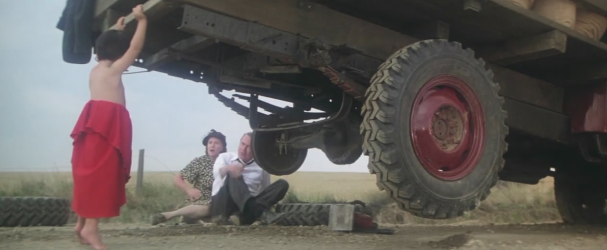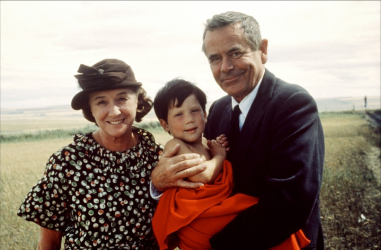You will believe a man can fly. Or will you? This is the big question in revisiting a 40-year old film which, while state of the art at the time, is as far removed from today as it was from Wizard of Oz. Still, while 40 years can lend a lot of charm, it can also reduce things to the hokey and I wondered if the sincerity of the original Superman feature—for this was the first time Superman was given a full-length movie—along with the necessarily dated effects would come across as quaint or perhaps just cheesy.
On reviewing, this is easily the best Superman and possibly the best superhero movie ever made.

I don’t know why people go on about child labor. They’re plenty strong.
When Christopher Reeve shows up, probably a good half-hour or more into the film(!), it’s instantly clear that no one to ever wear the cape has had his comic genius. He nails the persona of Clark Kent like no other actor has, fumbling and fainting and running in fear, all with an earnestness that’s true to the Superman character and the sly, hidden confidence that comes from nigh invulnerability. It was something you didn’t see much from Kirk Alyn or George Reeve, and something you’d never see at all from the new guy. (I don’t even remember if he ever shows up as Clark Kent in the Man Of Steel.)
But the beauty of this film is that it doesn’t forget the critical elements of moviemaking. Yes, there’s spectacle: It was heralded as the most expensive movie made at the time. (Of course, they don’t adjust for inflation, or the 1960 Cleopatra would’ve beaten it easily.) But even though Lex Luthor’s master plan will kill millions, Superman’s weakness is his love for Lois Lane. It is because of her he defies his father’s orders and goes back in time to save her.
That effect, by the way, still doesn’t read: When he’s flying around the earth superfast, it looks like he’s turning the world in the reverse direction. But that’s just silly (in a way the rest of the movie has not been) and wouldn’t turn back time. But I don’t know how else you could do this well.

For one brief, shining moment, we were Saturn.
Gene Hackman is superb as Lex Luthor. The bored genius who casually kills people and in the most preposterous ways. In the cut we saw—and I’m not sure which cut that was, because the Krypton scenes were much lengthier than the 1978 release—he has a device whose sole purpose is to push interlopers in front of oncoming subway trains. He has a hall full of machine guns and flame throwers and, uh, ice throwers, solely to test Superman’s invulnerability. His plan itself is completely nuts: Blow up the San Andreas fault and push California into the sea to profit from the new beachfront community.
But it’s all so much fun.
And it’s so different from anything produced today. Superman spends his time saving people, by-and-large. Since no one can cause him any direct harm, he never fights anyone: He flies fast, he lifts big—really, big, like tectonic plate big— things, he drops criminals off at the police station or prison “until they can get a fair trial”. That line, by the way, got big laughs when I saw it in 1978, because those were cynical times preceded by movies dominated by vigilante heroes (and leading into the ’80s where villains had to be killed, sometimes outright murdered, and preferably in horribly spectacular ways).
The funny thing is that, in retrospect, it’s really the corny stuff that works best. The innuendo is okay, very mild by today’s standards. But Superman isn’t just a power fantasy, he’s aspirational: While we, perhaps, wish for his superpowers, we wish even more to believe that, had we those powers, we would be as good as he is. That we, too, would uphold “truth, justice and the American way”—words that may not even be spoken sincerely today. And that includes “truth” and “justice” not coincidentally to “the American way”.

Part of the American Way is not murdering people without a fair trial first.
While not a Margot Kidder never fit the visual of Lois Lane (I think) she nails the personality in a not-taking-herself-too-seriously modern feminist way. Lois always was cutting edge, getting herself into predicaments to chase a story: Really an archetype of the fast-talking ’40s reporter girl of the sort played by Katharine Hepburn or Rosalind Russell back in the day. But she can be tough and fearless without needing to be Superman’s equal (an impossibility for anyone). And she can swoon, moon and—well, she couldn’t croon, I guess, or she would’ve sung Can You Read My Mind? rather than speaking it.
Point is, she’s reckless and lovable, which is not allowed these days.

I can’t even imagine a publicity shot like this today.
The rest of the supporting cast is great. Ned Beatty as the dull-witted minion to Gene Hackman’s Lex Luthor. Valerie Perrine as the epitome of the moll, who takes advantage of Supes when he’s weakened. “Why is it I can’t get it on with the good guys?” she complains endearingly. Former child actor Jackie Cooper, approaching his sixth decade in the business, made an unequaled Perry White, and Marc McClure is a bang-on Jimmy Olsen (except of course too old because you couldn’t have kids working in offices in the ’70s). Glenn Ford and TV stalwart Phyllis Thaxter give warm, wholesome performances as the Kents. And, of course, Marlon Brando and Susannah York are the other-worldly Kryptonians.
Score, of course, by John Williams. You can probably hum it right now.
Director Richard Donner (Lethal Weapon, The Omen, The Goonies) and producers Alexander and Ilya Salkind (Santa Claus: The Movie) were at odds during the shooting of this resulting in the diminishing of the sequel with literal pie-in-the-face slapstick (and culminating about 10 years ago with “The Donner Cut” of Superman II), but it’s pretty clear Donner was correct: Superheroes don’t need any help being campy or comic. It’s kind of in their nature. You have to get at the human beyond the spectacle or you end up with something cold, something mechanical or something just dumb.
While modern superhero movies (especially the recent two with Superman) give us a “Superman as God” theme, this movie is much, much smarter and more relatable because it tells us even Superman isn’t God. For all his super-powers, he can still be brought to his knees by love. I don’t know, maybe that showed up somewhere in Man of Steel right before he snapped Zod’s neck. (Boo!)
The only Superman movie that comes close to this is Superman II (and I have not seen the Donner cut), but it may also be the best superhero movie ever. The Boy and the Flower were pretty sure of it.

This Pa Kent would never say, “Hey, maybe don’t save that busload of kids. ’cause…reasons.”

The Donner Cut of Superman II is well-worth the time, though you can tell there are a few concessions made (such as test footage when real footage was unavailable). One notable difference is that the first film was meant to lead more directly into the second – the explosion that shatters the Phantom Zone is from one of Lex’s rockets.
I don’t really get the complaints about this film. The pacing is slow in the front, but it’s supposed to be… Kal-El is in that rocket long enough to age almost five years, then he’s a farm boy dealing with the quiet of a town literally named Smallville when his powers make him pretty much too big for the whole world, and finally after his Pa dies and he goes on his long pilgrimage to the North, he gets to spend another decade up there before he’s finally ready, literally and figuratively, to take off – and then the movie takes off with him. One of the absolute best moments in film is when you finally hear the score swell into the fanfare and see him in his costume, in the distance… and he just steps off the ledge and casually zips past us. The very next shot is (IIRC) a smash-cut to the bustling office of the Daily Planet. That’s tremendous work. Donner had perfect confidence in his cast and in how it was going to work.
(Another complaint and a pet peeve of mine: Supes didn’t reverse the spin of the Earth. That would have just killed everyone. He broke the time barrier, and as a result it looks like Earth was going backwards. He could have done that by flying in a straight line and then back again, but circling is more practical because he isn’t billions of miles away and he can look down to see how far back he’s gone – in fact he does peek from time to time. Then the same thing in reverse as he restores the normal flow of time and makes sure he stops at the right point.)
Sorry this is on an old post, just discovered the site and have been perusing. Thanks for the reviews.
For the record, I’m not complaining about this film at all, just noting the differences between the version I remember seeing as a child.
I’d place it in the top 5 all-time costumed vigilante films, if not #1.
Great film that holds up well.. Every time I watch it however I just keep wondering how much better of a film it would have been had Stockard Channing been cast as Lois Lane. A DVD extra I watched years ago had her screen test for it. How could they have not gone in that direction!?
Wow, I was not aware of the Stockard Channing connection. I can see Kidder having more of the look of the comic book Lois but I think agree Channing would’ve been better in a lot of ways.